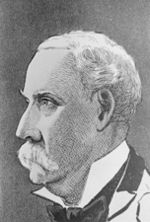Edward Murphy Jr., Date of Birth, Place of Birth, Date of Death
TweetEdward Murphy Jr.
American politician
 Date of Birth: 15-Dec-1836
Date of Birth: 15-Dec-1836
 Place of Birth: Troy, New York, United States
Place of Birth: Troy, New York, United States
Date of Death: 03-Aug-1911
Profession: politician
Nationality: United States
Zodiac Sign: Sagittarius 
About Edward Murphy Jr.
- Edward Murphy Jr.
- (December 15, 1836 – August 3, 1911) was a businessman and politician from Troy, New York.
- A Democrat, he served as mayor of Troy, New York (1875–1883), chairman of the New York State Democratic Committee (1888–1894), and a United States Senator from New York (1893–1899). A native of Troy, Murphy was educated in Troy and attended the Collège de Montréal with the intention of becoming a priest.
- Deciding to pursue a business career instead, Murphy attended St.
- John's College (now Fordham University), from which he graduated in 1857.
- He then joined his father's brewing business, which he managed in partnership with his father.
- After his father's retirement, Murphy operated the brewery until merging with another local brewer to form a partnership known as Murphy & Kennedy.
- Murphy's other business interests included serving as president of the Troy Gas Company.
- Murphy was also a shareholder in the Troy City Railway and the city's electric company. Long active in politics as a Democrat, Murphy was a delegate to many of the party's local, county, state, and national conventions.
- He was active in Troy's city government, and served as an alderman from 1864 to 1866, fire commissioner from 1874 to 1875, and mayor from 1875 to 1883.
- From 1888 to 1894 he was chairman of the New York State Democratic Committee.
- In 1893, Democrats controlled the New York State Legislature, and were able to elect a Democrat to the U.S.
- Senate as the successor to Frank Hiscock.
- Murphy was selected as the Democratic nominee, and won the legislative election.
- Murphy served one term, March 4, 1893 to March 3, 1899.
- Republicans controlled the legislature in 1899, and Murphy was succeeded in the Senate by Republican Thomas C.
- Platt. After leaving the Senate, Murphy resumed his former business pursuits in Troy, attended several national Democratic conventions as a delegate, and served as chairman of the Rensselaer County Democratic Committee.
- He died at his summer home in Elberon, New Jersey on August 3, 1911.
- Murphy was buried at St.
- Mary's Catholic Cemetery in Troy.
Read more at Wikipedia

